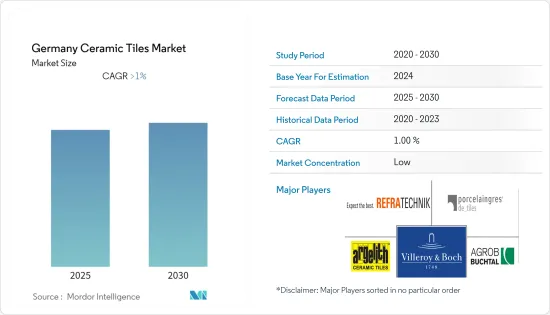
|
市場調査レポート
商品コード
1683432
ドイツのセラミックタイル市場:市場シェア分析、産業動向、成長予測(2025~2030年)Germany Ceramic Tiles - Market Share Analysis, Industry Trends & Statistics, Growth Forecasts (2025 - 2030) |
||||||
カスタマイズ可能
適宜更新あり
|
|||||||
| ドイツのセラミックタイル市場:市場シェア分析、産業動向、成長予測(2025~2030年) |
|
出版日: 2025年03月18日
発行: Mordor Intelligence
ページ情報: 英文 130 Pages
納期: 2~3営業日
|
全表示
- 概要
- 目次
ドイツのセラミックタイル市場は予測期間中に1%を超えるCAGRで推移すると予想されています。

ドイツは欧州のセラミックタイルの主要市場の一つです。同国は、瓦、レンガ、衛生陶器など、高度に開発された最先端のセラミック製品の恩恵を受けています。また、住宅建設に対する消費者の支出が大きいことも、市場の成長を促す要因となっています。建設部門の好況は、国家投資と低金利に起因します。新しい住宅インフラに対する需要の高まりは、ドイツのセラミックタイル市場の成長に影響を与える主要要因です。ドイツは欧州におけるカオリンの重要な生産国のひとつです。
ドイツでは、セラミックタイル市場も同様に成長しています。2020年のタイル輸入量は9.8%増加し、合計1億1,360万平方メートルとなりました。統計によると、平均輸入価格は1平方メートル当たり4.00~13.85ユーロです。多くの場合、より安い価格でより多くの量が購入されています。イタリアの輸入量は約6,020万平方メートルで安定しており、トルコ(1,470万平方メートル)、スペイン(1,120万平方メートル)、ポーランド(1,120万平方メートル)、チェコ共和国(750万平方メートル)と続きます。輸入の増加は、自国市場が崩壊した後、他国のメーカーが安定したドイツ市場にシフトしたことで説明できます。同時に、このシフトは、製品の約3分の1を輸出しているドイツのメーカーが、状況によっては重要な輸出市場を失ったことを意味します。
ドイツのセラミックタイル市場動向
建設活動の増加が市場を牽引
建設支出の増加がドイツのセラミックタイル市場を牽引しています。内装建設産業におけるセラミックタイルの高い採用率と床タイルからの高い収益が、ドイツのセラミックタイル市場の成長を後押しすると予想されます。ドイツでは建設産業が有望であるため、セラミックタイルの需要は予測期間中に加速すると予想されます。急速な工業化と都市化により、住宅、商業、工業の建設活動が増加し、セラミックタイルの需要が高まっています。ドイツでは、2007~2020年にかけて、住宅建設許可の総数が増加しました。この間、許可証の発行総数は18万2,000件から36万8,000件以上に増加し、100%以上の伸びを示しました。
市場を牽引するフロアセグメント
セラミックタイルは微細で高密度の粘土から作られ、極端な温度で焼成されるため、人の往来が多い床材に優れた耐久性を記載しています。新製品の開発と手間のかからない施工技術が、業務用床材のセラミックタイル市場を大きく牽引しています。セラミック床材は、抗菌性、防滑性、耐水性を備えているため、医療や施設建築物など様々なセグメントで費用対効果が高く、エコフレンドリーソリューションとして台頭しています。スタイリッシュで安価な床材を求める消費者や、高品質の床タイルに対する需要の高まりといった要因が、ドイツのセラミックタイル市場の成長に寄与しています。
ドイツのセラミックタイル産業概要
本レポートでは、ドイツのセラミックタイル市場で事業を展開する主要国際企業を取り上げています。市場シェアに関しては、現在いくつかの大手企業が市場を独占しています。しかし、技術進歩や製品革新に伴い、中堅から中小企業は新規契約の獲得や新市場の開拓によって市場での存在感を高めています。
その他の特典
- エクセル形式の市場予測(ME)シート
- 3ヶ月間のアナリストサポート
目次
第1章 イントロダクション
- 調査の前提条件と市場定義
- 調査範囲
第2章 調査手法
第3章 エグゼクティブサマリー
第4章 市場力学
- 市場概要
- 市場促進要因
- 市場抑制要因
- バリューチェーン/サプライチェーン分析
- ポーターのファイブフォース分析
- 新規参入業者の脅威
- 買い手/消費者の交渉力
- 供給企業の交渉力
- 代替品の脅威
- 競争企業間の敵対関係
- 産業の技術動向に関する洞察
- COVID-19の市場への影響
第5章 市場セグメンテーション
- 製品
- 釉薬
- 磁器
- スクラッチフリー
- その他
- 用途
- 床タイル
- 壁タイル
- その他のタイル
- 建築タイプ
- 新築
- 買い替え・リフォーム
- エンドユーザー
- 住宅用
- 商業
第6章 競合情勢
- 市場集中度概要
- 企業プロファイル
- Villeroy & Boch
- Agrob Buchtal
- Argelith Ceramic Tiles Inc
- Porcelaingres GmbH
- Refratechnik Ceramics GmbH
- Golem
- Alois Korzilius Interbau.
- klingenberg dekoramik gmbh
- Tonality gmbh
- Steuler Fliesen GmbH*
第7章 市場機会と今後の動向
第8章 免責事項と出版社について
The Germany Ceramic Tiles Market is expected to register a CAGR of greater than 1% during the forecast period.

Germany is one of the European region's major markets for ceramic tiles. The country has the benefits of highly developed and most advanced ceramic products like roof tiles, bricks, sanitary ware, etc. The significant consumer expenditure on residential and housing construction is another factor that benefits the market growth. The booming prospects of the construction sector are attributed to state investments and low-interest rates. The rising demand for new residential infrastructures is the principal factor influencing the German ceramic tiles market growth. Germany is one of the significant producers of kaolin in the European region.
In Germany, the ceramic tile market has grown similarly. Imports of tiles in 2020 climbed by 9.8%, totaling 113.6 million square meters. According to statistics, average import prices range from 4.00 to 13.85 euros per square meter. Frequently, a larger volume was purchased at a lower price. Italy's imports remain stable at roughly 60.2 million square meters, followed by Turkey (14.7 million square meters), Spain (11.2 million square meters), Poland (11.2 million square meters), and the Czech Republic (7.5 million square meters). The increased imports can be explained by the fact that after their home market collapsed, manufacturers in other countries shifted to the stable German market. At the same time, this shift means that German manufacturers, who export around a third of their products, have lost a significant export market in some situations.
Germany Ceramic Tiles Market Trends
Rising Construction Activities are Driving the Market
Increasing construction spending is the key factor in driving the ceramic tiles market in Germany. The high adoption rate of ceramic tiles in the interior construction industry and high revenue generation from the floor tiles are anticipated to boost the German ceramic tiles market growth. Due to the promising construction industry in Germany, the demand for ceramic tiles is expected to accelerate over the projected period. Rapid industrialization and urbanization have resulted in increased residential, commercial, and industrial construction activities, thereby escalating the demand for ceramic tiles. Germany had a general increase in the total number of permits issued for residential property construction between 2007 and 2020. In that period, the total number of permits issued increased from 182 thousand to over 368 thousand, an increase of over 100%.
Floor Segment is Driving the Market
Ceramic tiles are made from fine, denser clay and fired at extreme temperatures, offering superior durability to the flooring with exposure to high traffic. Developing new products and hassle-free installation techniques have considerably driven the ceramic tiles market in commercial flooring. Ceramic floorings are emerging as cost-effective and eco-friendly solutions in various sectors, including healthcare and institutional buildings, owing to the product's antibacterial, anti-slip, and water-resistant properties. Factors such as consumers seeking stylish and less expensive flooring options and escalating demand for high-quality floor tiles will contribute to the growth of the German ceramic tiles market.
Germany Ceramic Tiles Industry Overview
The report covers major international players operating in the German Ceramic Tiles Market. Regarding market share, some of the major players currently dominate the market. However, with technological advancement and product innovation, mid-size to smaller companies are increasing their market presence by securing new contracts and tapping new markets.
Additional Benefits:
- The market estimate (ME) sheet in Excel format
- 3 months of analyst support
TABLE OF CONTENTS
1 INTRODUCTION
- 1.1 Study Assumptions and Market Definition
- 1.2 Scope of the Study
2 RESEARCH METHODOLOGY
3 EXECUTIVE SUMMARY
4 MARKET DYNAMICS
- 4.1 Market Overview
- 4.2 Market Drivers
- 4.3 Market Restraints
- 4.4 Value Chain / Supply Chain Analysis
- 4.5 Porter's Five Forces Analysis
- 4.5.1 Threat of New Entrants
- 4.5.2 Bargaining Power of Buyers/Consumers
- 4.5.3 Bargaining Power of Suppliers
- 4.5.4 Threat of Substitute Products
- 4.5.5 Intensity of Competitive Rivalry
- 4.6 Insights on Technological Trends in the Industry
- 4.7 Impact of COVID-19 on the Market
5 MARKET SEGMENTATION
- 5.1 Product
- 5.1.1 Glazed
- 5.1.2 Porcelain
- 5.1.3 Scratch Free
- 5.1.4 Others
- 5.2 Application
- 5.2.1 Floor Tiles
- 5.2.2 Wall Tiles
- 5.2.3 Other Tiles
- 5.3 Construction Type
- 5.3.1 New Construction
- 5.3.2 Replacement and Renovation
- 5.4 End User
- 5.4.1 Residential
- 5.4.2 Commercial
6 COMPETITIVE LANDSCAPE
- 6.1 Market Concentration Overview
- 6.2 Company Profiles
- 6.2.1 Villeroy & Boch
- 6.2.2 Agrob Buchtal
- 6.2.3 Argelith Ceramic Tiles Inc
- 6.2.4 Porcelaingres GmbH
- 6.2.5 Refratechnik Ceramics GmbH
- 6.2.6 Golem
- 6.2.7 Alois Korzilius Interbau.
- 6.2.8 klingenberg dekoramik gmbh
- 6.2.9 Tonality gmbh
- 6.2.10 Steuler Fliesen GmbH*


